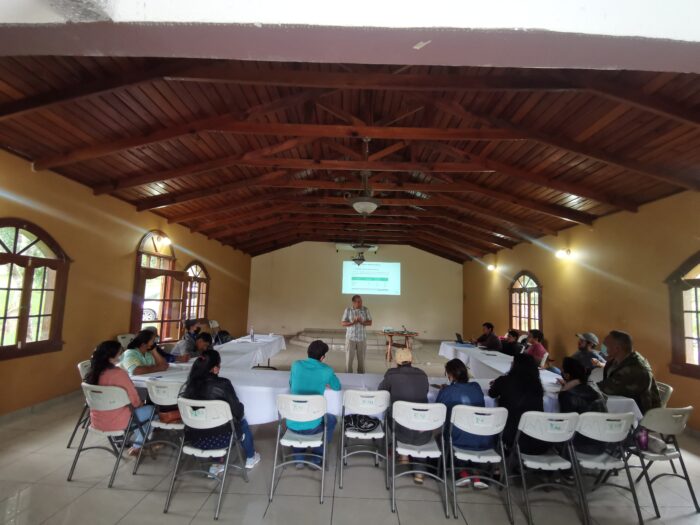
Local leadership, initiative and innovation are primary components that lead to economic growth of producer organizations. This is true of the coffee and cacao cooperatives and associations that NCBA CLUSA’s USAID-funded Farmer-to-Farmer (F2F) program works with in Latin America. The ability to identify challenges, generate solutions, set agendas, and lead decision making allows these organizations to thrive rather than survive. Through demand-driven programs, like F2F producer organizations can build upon their goals and expand the capacities of their members. NCBA CLUSA has had the pleasure of implementing F2F since 2018 and has sent over 100 volunteers to develop the technical deficiencies identified by the cooperatives and associations themselves. The expert volunteers provide assessments and trainings to coffee and cacao industry leaders and producers on topics they’ve identified such as finance, organic production, business planning, product development and many other topics.
Two great examples of NCBA CLUSA’s F2F organizations that have set their own agenda to develop their associations are Asociacion de Productores Selva Nor Oriental (APROSELVANOR) in Peru and Café Orgánico Marcala Sociedad Anónima (COMSA) in Honduras. They are two coffee industry leaders in their respective countries that produce award-winning organic coffee and export their products internationally. Both organizations, in efforts to become more sustainable and motivate their members to protect their natural resources, requested and completed assignments with NCBA CLUSA related to reduction of their carbon footprint and prevention of toxins leaching into soils.
APROSELVANOR is a coffee cooperative founded in 2015 by 372 small coffee producers in Peru, which holds several organic certifications and are dedicated to the production, processing, and distribution of green coffee to national and international markets. In the post-harvest process, APROSELVANOR discovered their processing facilities were not efficient in removing the high acidity organic byproduct that coffee processing creates after fermentation called honey water. The majority of APROSELVANOR’s members applied experimental methods of digging a hole in their coffee field to dispose of the honey water generated. However, this method does not have any specific decontamination steps, which results in the contaminants leaching into the soil. Therefore, they requested an assignment to help them identify a sustainable solution. In May of 2022, Farmer-to-Farmer volunteer Dr. Stacy Hutchinson, Associate Dean of Research and Professor of Biological and Agricultural Engineering at Kansas State University’s Carl R. Ice College of Engineering, who is an expert on water treatment facilities, helped implement a cost effective, sustainable honey water treatment solution throughout the organization.
APROSELVANOR and Dr. Hutchinson successfully found a local sedimentary rock with the ability to buffer pH at some coffee farms. By the end of the assignment, Dr. Hutchinson and APROSELVANOR strengthened the relationship with a local university to develop a monitoring plan to assess the treatment system’s effectiveness and provide soil health testing near disposal areas. This data will allow them to prioritize treatment system installations at locations with the highest potential environmental risk. During the assignment, APROSELVANOR gained important information on treatment design and testing to optimize site specific treatment systems. During the months following the assignment, they were recommended to enhance Farm Information Database to include information on treatment systems, develop a monitoring plan, reduce water use, install a PH adjustment system, and potentially install an organic treatment system to reduce honey water produced. Now that the challenges have been identified, they have the tools to set an agenda towards meeting these specific objectives.
COMSA in Honduras, was established in December 2001 and they have been working for 18 years to contribute to the coffee sector through organic agriculture and innovative processing methodologies. After conducting several studies in 2014 and 2017 on the effects of climate change on their coffee production, COMSA developed a green action plan. The plan consisted of activities that would reduce emissions during the cultivation and processing of their coffee. COMSA, being an entrepreneurial organization, wished to learn how they could obtain compensation for the implementation of the mitigation actions to reduce their emissions and how to obtain a carbon neutral certification. Through the efforts made by F2F volunteer Jairo Garcia, specialist in Climate Change, was able to assist COMSA in their vision to enter a new market to diversify their business and improve the organization’s climate responsibility. At the end of the assignment, Garcia left the organization with actionable next steps on what he believed they would need to do to successfully reach their goal of obtaining a carbon neutral certification and gain compensation for their mitigation efforts. The first step is for COMSA to assign a full-time staff member to work on updating their carbon footprint and obtaining their carbon neutral certification. Next is for the association to prioritize and update the carbon emissions reports annually.


